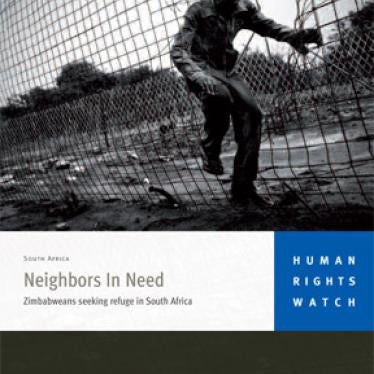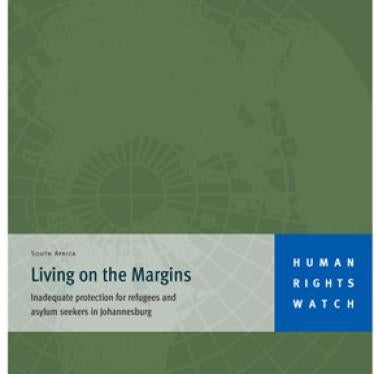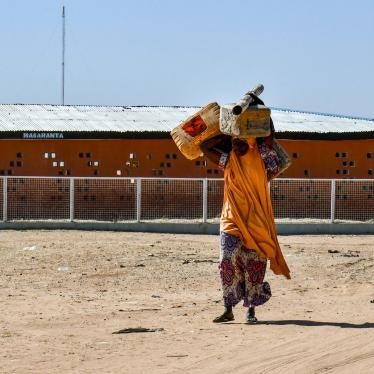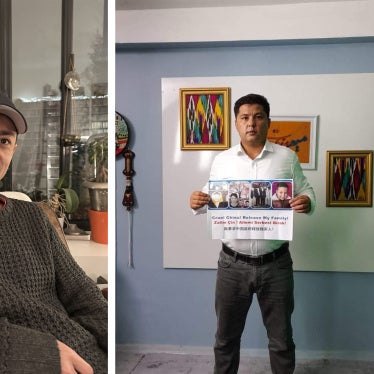(Johannesburg) – The South African government should quickly open a new refugee reception center in Johannesburg, Human Rights Watch said today. The closing of the existing center on June 1, 2011, will make it even harder for asylum seekers to lodge claims in the country’s chronically overburdened asylum system, which increases asylum seekers’ risk of being caught without the required permit to stay in the country and deported, Human Rights Watch said.
While acknowledging that the office closure puts all asylum seekers at risk, Human Rights Watch urged the South African government to extend its moratorium on deportations of Zimbabweans until Johannesburg has a functioning refugee reception center. In the two years before South Africa suspended deportations of Zimbabweans in April 2009, police deported an estimated 400,000 Zimbabweans, including asylum seekers who had been unable to lodge their claims. International law prohibits the deportation of refugees and asylum seekers whose safety would be at risk.
“The government is obliged to protect anyone seeking asylum in South Africa,” said Siphokazi Mthathi, South Africa director at Human Rights Watch. “The closing of the Johannesburg refugee center is a serious blow for asylum seekers already struggling to get protection in a dysfunctional system.”
In a May 27 statement, the Home Affairs director general said his department had decided to “relocate and transfer” the Crown Mines refugee reception center from Johannesburg to Pretoria. A Johannesburg court ordered the authorities to close the center because of the “nuisance and irritation” to local businesses caused by the large number of asylum seekers near the office.
The order is the third of its kind in 10 years and once again threatens to leave Johannesburg, the city with the largest number of refugees in South Africa, without a refugee office. Human Rights Watch said the transfer decision would cause hardship to tens of thousands of asylum seekers living in Johannesburg. Without an office in Johannesburg, refugees there would be forced to make a 140 kilometer round trip to Pretoria to lodge claims or renew their permits to remain in South Africa, at huge financial and other personal cost, including the risk of losing their jobs.
South African refugee rights groups have also warned that previous closings of refugee reception offices have resulted in lost files and other problems that interfered with asylum seekers’ ability to get services, including permit renewal. Without a permit, asylum seekers are technically illegally in South Africa and risk arrest and deportation if stopped by police.
South Africa has the world’s largest number of registered asylum seekers, most of them Zimbabwean. The numbers have risen steadily over the past six years. There were 20,000 new applications in 2005, 50,000 in 2007, and 264,000 in 2008, with similar numbers in 2010. Despite South Africa’s recent attempts to improve its asylum system, there is a backlog of hundreds of thousands of cases.
A 2008 Human Rights Watch report “Neighbors in Need: Zimbabweans Seeking Refuge in South Africa” highlighted the significant obstacles preventing many asylum seekers from lodging their claims within the required 14 days of arrival in South Africa or from renewing their permits on time, mostly due to long lines at the refugee centers. A 2005 Human Rights Watch report on the Johannesburg refugee reception center, “Living on the Margins: Inadequate Protection for Refugees and Asylum Seekers in Johannesburg,” documented similar problems.
The surge in asylum applications means the obstacles have almost certainly increased, and with it the risk of unlawful deportation of tens of thousands of Zimbabwean and other asylum seekers unable to lodge or renew their claims, Human Rights Watch said.
Under South African and international law it is unlawful to deport anyone who has expressed an intention to claim asylum or anyone who has already made an asylum claim while the claim is still pending. Deporting asylum seekers violates the most fundamental principle of refugee law, the principle of nonrefoulement, which guarantees a person’s right not to be forcibly returned to a place where the person would face a threat of persecution or a real risk of torture or cruel, inhuman, or degrading treatment or punishment.
“Once again, thousands of Zimbabweans and others seeking asylum in South Africa are at risk of unlawful deportation because of bad planning and misplaced policy decisions,” Mthathi said. “Closing the Johannesburg refugee reception office could precipitate another perfect storm of out-of-reach registration and mass deportations that will put refugees’ lives at risk.”








